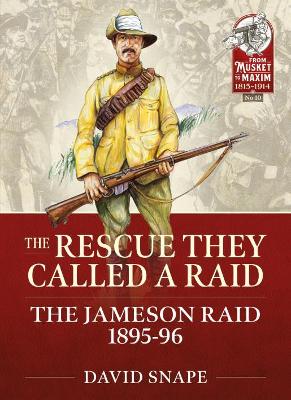From Musket to Maxim
2 total works
Almost one hundred and twenty five years ago, a Scottish adventurer attempted to expand the British Empire in South Africa with the backing of a mere 500 men. He was part of a conspiracy of entrepreneurs, gold magnates and politicians, each of whom had different motives for supporting and encouraging his actions. Leander Starr Jameson's Raid failed miserably. It almost brought down the British Government, destroyed the career of one of the most eminent South African Statesmen, nearly caused a war with the South African Republic and exposed Britain to international ridicule. It was a failed attempt to expand the Empire on the cheap.
This book, using a number of contemporary sources, examines the motives for Jameson's actions, the reasons for the Raid's failure and its consequences for those involved. It attempts to answer the extent of the involvement of the British Colonial Office and its Secretary of State, Joseph Chamberlain and how he, Cecil Rhodes, Paul Kruger and Jameson worked for their own and their countries best interests which were not necessarily one in the same.It also considers the part played by the dignitaries in Johannesburg and the consequences of their lukewarm support of Dr Jameson.
The book contains a detailed examination of the two Inquiries which were held as a result of the Raid and a blow by blow account of the evidence given by their many witnesses. Reactions in the British Parliament and the fate of the Raiders are particular features of this work,as is how the actions of those swept up in the plans of the key players were to affect their future careers.
This book, using a number of contemporary sources, examines the motives for Jameson's actions, the reasons for the Raid's failure and its consequences for those involved. It attempts to answer the extent of the involvement of the British Colonial Office and its Secretary of State, Joseph Chamberlain and how he, Cecil Rhodes, Paul Kruger and Jameson worked for their own and their countries best interests which were not necessarily one in the same.It also considers the part played by the dignitaries in Johannesburg and the consequences of their lukewarm support of Dr Jameson.
The book contains a detailed examination of the two Inquiries which were held as a result of the Raid and a blow by blow account of the evidence given by their many witnesses. Reactions in the British Parliament and the fate of the Raiders are particular features of this work,as is how the actions of those swept up in the plans of the key players were to affect their future careers.
The Shangani or Allan Wilson's Patrol was a minor incident in the British expansion in Africa. Much smaller in scale than the massacre of Isandlwana , the fate of the Patrol was a black mark on the British South Africa's conquest of Matabeleland. The Patrol was part of the Ndebele War of 1893-94 which ended in the overthrow of the kingdom of Lobengula, King of the Ndebele.
The war was a joint enterprise of Cecil Rhodes' British South Africa Company and the British Government but the Company was the senior partner. Leander Starr Jameson with his military adviser John Willoughby , both of whom were to be protagonists in the notorious Jameson Raid, were heavily involved in the overthrow of Lobengula . Jameson's instructions to the leader of the Patrol, Major Patrick Forbes, placed him in an invidious position and virtually split his command. Allan Wilson and his men were sent to his death by Forbes but Wilson's overconfidence in his ability to fight the Ndebele also played a major part in the massacre of his men.
The relationships between the three commanders of the Patrol was fraught with difficult and Forbes' struggle to maintain control was gradually eroded by Commandant Pieter Raaff, the Afrikaner with extensive experience in fighting the Zulus, whose caution might have been caused by his fatal illness.
Accounts from Ndebele survivors of the battle paint a typical Victorian picture of brave men dying for Queen and country but did they actually die for Queen and Company? Did Forbes leave them to their fate? Whatever the cause, Wilson's men's bravery was unquestioned
The book provides an account of the causes of Ndebele War, and the relationship between the BSAC and Lobengula. The Patrol is examined in detail as are the battles of Shangani and Bembesi which preceded it. The theft of Lobengula's gold by two members of the Bechuanaland Border Police became a cause celebre and may have contributed to Jameson's decision to send the Patrol in pursuit of the King.
The Company's victory contributed to the creation of Rhodesia and Shangani Day soon became a national holiday in the country. Jameson was seen as a hero and decorated by Queen Victoria for his part in the war.
In compiling the story of the Patrol, David Snape has used both contemporary accounts , Parliamentary Papers and the work of other historians to analyse the complexity of the circumstances which led to Wilson's death and attempts to explore the less savoury aspects of this episode in the expansion of the British Empire whilst acknowledging the bravery of those involved.
The war was a joint enterprise of Cecil Rhodes' British South Africa Company and the British Government but the Company was the senior partner. Leander Starr Jameson with his military adviser John Willoughby , both of whom were to be protagonists in the notorious Jameson Raid, were heavily involved in the overthrow of Lobengula . Jameson's instructions to the leader of the Patrol, Major Patrick Forbes, placed him in an invidious position and virtually split his command. Allan Wilson and his men were sent to his death by Forbes but Wilson's overconfidence in his ability to fight the Ndebele also played a major part in the massacre of his men.
The relationships between the three commanders of the Patrol was fraught with difficult and Forbes' struggle to maintain control was gradually eroded by Commandant Pieter Raaff, the Afrikaner with extensive experience in fighting the Zulus, whose caution might have been caused by his fatal illness.
Accounts from Ndebele survivors of the battle paint a typical Victorian picture of brave men dying for Queen and country but did they actually die for Queen and Company? Did Forbes leave them to their fate? Whatever the cause, Wilson's men's bravery was unquestioned
The book provides an account of the causes of Ndebele War, and the relationship between the BSAC and Lobengula. The Patrol is examined in detail as are the battles of Shangani and Bembesi which preceded it. The theft of Lobengula's gold by two members of the Bechuanaland Border Police became a cause celebre and may have contributed to Jameson's decision to send the Patrol in pursuit of the King.
The Company's victory contributed to the creation of Rhodesia and Shangani Day soon became a national holiday in the country. Jameson was seen as a hero and decorated by Queen Victoria for his part in the war.
In compiling the story of the Patrol, David Snape has used both contemporary accounts , Parliamentary Papers and the work of other historians to analyse the complexity of the circumstances which led to Wilson's death and attempts to explore the less savoury aspects of this episode in the expansion of the British Empire whilst acknowledging the bravery of those involved.

